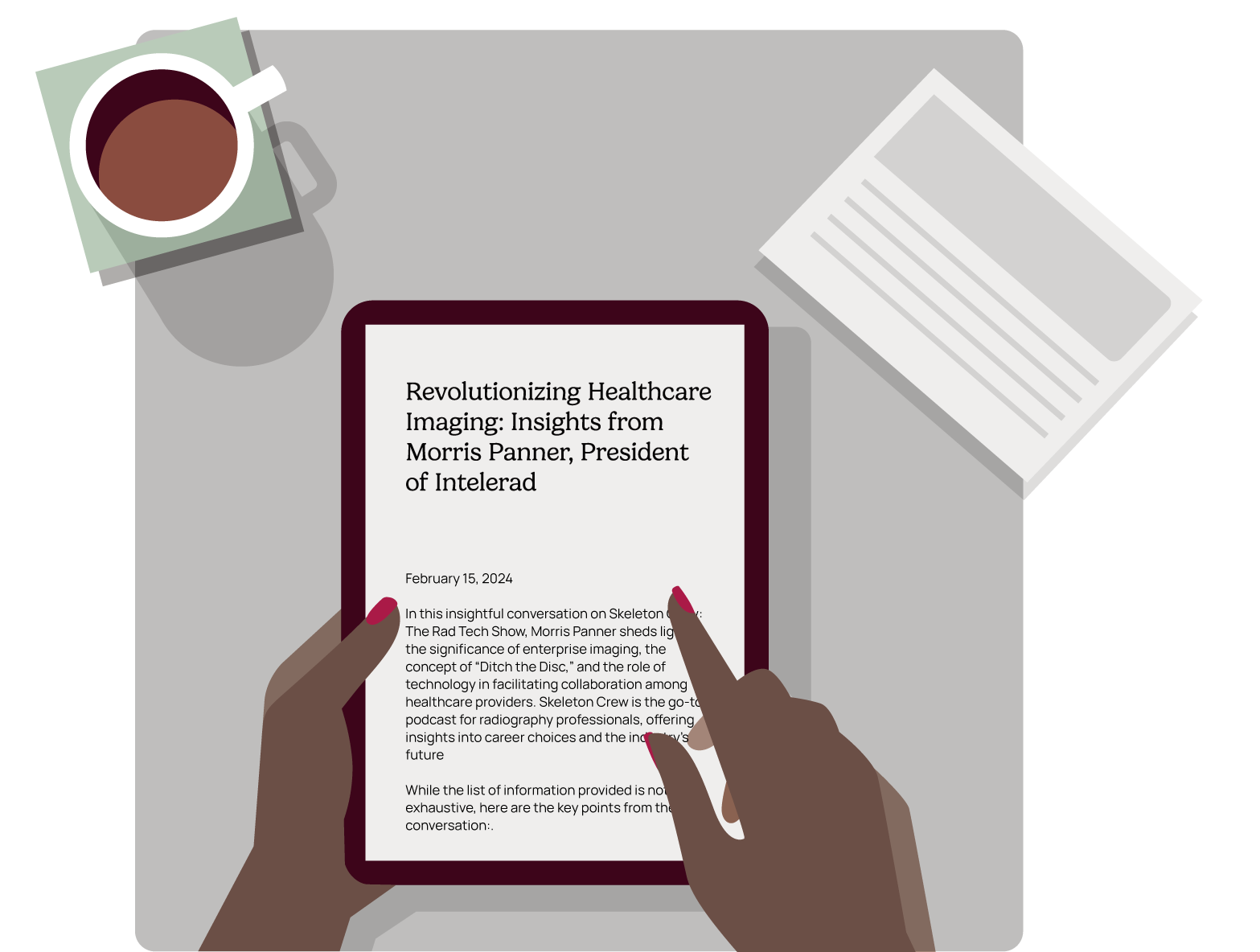February 15, 2024
In this insightful conversation on Skeleton Crew: The Rad Tech Show, Morris Panner sheds light on the significance of enterprise imaging, the concept of “Ditch the Disc,” and the role of technology in facilitating collaboration among healthcare providers. Skeleton Crew is the go-to podcast for radiography professionals, offering insights into career choices and the industry’s future.
While the list of information provided is not exhaustive, here are the key points from the conversation:
-
Intelerad’s Role in Australian Healthcare Innovation:
Morris Panner, President of Intelerad, underscored the pivotal role Intelerad plays in driving Australian healthcare imaging innovation. The company’s agile technology solutions, specifically in teleradiology and telemedicine, address the unique challenges posed by Australia’s expansive and remote geography. These innovations have proven instrumental in delivering essential healthcare services to populations in remote areas with limited bandwidth access.
-
Overview of Intelerad and Its Core Offerings in Healthcare Imaging:
Intelerad, a PACs company, boasts industry-leading solutions encompassing work lists, image exchange, and cardiac imaging products. Morris Panner emphasized that Intelerad is at the core of the day-to-day workflow for radiology groups, imaging centers, and hospitals. The company’s commitment lies in providing comprehensive enterprise imaging platforms, efficient workflow management, and advanced image exchange capabilities.
-
The Importance of “Ditch the Disk” Initiative:
Morris Panner highlighted Intelerad’s active support for the “Ditch the Disk” initiative, advocating the abandonment of physical CD/DVDs for medical image sharing. The discussion emphasized Intelerad’s dedication to promoting seamless sharing and interoperability of medical images, with a strong emphasis on transitioning towards digital solutions for enhanced accessibility for patients and collaborative healthcare imaging practices for clinicians.
-
Enterprise Imaging and Workflow Defined in Healthcare Imaging:
Morris Panner elucidated the concept of enterprise imaging, describing it as a comprehensive workflow encompassing routing, visualization, reporting, sharing, and storage of medical images. The discussion stressed the importance of having an integrated platform that facilitates the seamless flow of imaging data across different stages and users, from end-to-end. This promotes collaboration and delivery of comprehensive patient care in healthcare imaging.
-
Integration with Epic’s “Care Everywhere” and Interoperability:
Intelerad’s integration into systems like Epic’s “Care Everywhere” was discussed, showcasing the ease of accessing and viewing imaging data by healthcare professionals. The conversation touched upon the evolving interoperability landscape, influenced by federal regulations such as the 21st Century Cures Act. This act aims to empower patients by facilitating easier access to their health records, including crucial imaging data.
-
Global Presence and Business Focus in Healthcare Imaging:
Intelerad’s global presence extends beyond North America, with significant business operations in the United Kingdom and Australia. The company’s international success is attributed to its adaptability to diverse healthcare landscapes, providing tailored solutions to meet the specific needs and regulations in different regions. This reflects the global nature of healthcare workflows and Intelerad’s impact on healthcare imaging worldwide.
-
Transitioning from Clinical Practice to Technology Roles:
The discussion then shifted toward exploring career transitions from clinical roles to technology-focused positions within companies like Intelerad. Morris Panner shared a real-life example of a clinician who successfully transitioned to a leadership role within Intelerad. The transition brought valuable clinical expertise, industry insight, and a willingness to engage in the business side of technology in the context of healthcare imaging.
-
The People-Centric Nature of Technology Business:
Morris Panner challenged the perception of technology businesses as purely technical, labeling them as inherently people-centric. He stressed the significance of understanding workflow, industry challenges, and cultivating empathy for end-users. The discussion highlighted the various roles and opportunities within technology companies, emphasizing the crucial blend of clinical expertise and technology in the dynamic field of healthcare imaging.





